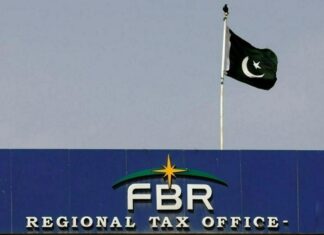As one drove down the Native Jetty Bridge, the unpleasant ubiquitous stench of stale fish hit the nostrils. With high-axle vehicles rolling towards Karachi Port, all of a sudden the road felt narrower and congested. And then the car stopped. I had arrived at the Jackson Market – the biggest and most popular black market of the largest and most populous metropolitan of the country.

Standing adjacent to a dilapidated church, the entire neighbourhood is Raj-period architecture. The shops are on the one side, placed in linear form next to each other, while vendors offering street food lineup on the other.
Inside these oblong little structures you would find crammed everything electronic that you might require for home – ranging from television sets, washing machines, air conditioners, theatre speakers and bicycles, at prices to kill for.
Irresistible branded bargains
Previously the sales point for second hand appliances from ships, the local legend recounted by the shopkeepers puts Jackson Market’s age as it stands today at around 35 years.
“Every month at the beginning, truck loads of electronic equipment comes to the market, with the shop owners bidding for the stuff. The one with the highest walks away with the best stuff,” said 40-year old Ameen Abro, manning his shop – the first at the corner and the largest – with two of his sons in tow.
Jackson specialises in second-hand international brands at half the price, or even less. The serious bargains remain the major enduring attractions why people still come all the way to shop at Jackson. Another temptation is home delivery upon request, which every outlet at Jackson offers.

Top of the line brands like Sony, Samsung, Kenwood etc. are all up there for grabs, at a fraction of the regular price tag, making it quite affordable even to the less well-heeled. That is perhaps why shop-owners also come over to pick up pieces of their choice from Jackson to resell at a premium at their upscale outlets.
Abro confided that most of the B2B shopping that takes place at Jackson is by savvy shopkeepers from the Saddar’s electronics markets, who usually pick up refrigerators and air conditioners etc. The number of such traders has however said to have decreased quite considerably over time.
Since this writer was on her own, Abro sent his youngest son to take me along and guide me. Only a dozen years old, already the young prodigy knew everything that was there to know about the Jackson. Strutting about the place, he was familiar Throughout the tour, he kept strutting about as if he was in his own backyard, greeting the shop-owners with familiarity that bordered on intimacy.
“I have been around at our shop since when I was just three. I know all the bylanes, each and every turn, and everybody around here,” crowed the young prodigy with an air of confidence that could only be seen to be believed.

Dodging the import duty
According to a Pakistan government report, the undocumented trade on the Pak-Afghan Torkham and Chaman borders exceeds $2.5 billions annually. The smuggled stuff east of the Durand Line includes cheap electronics, fabrics, medicines and tyres.
“None of the appliances we sell are imported. All of these are trucked down from the Afghanistan border. The truck driver usually has a deal with the duty officer over there, which explains how the import duties are dodged,” said Abro.
This writer’s next destination was a store – again a large one – selling air conditioners. From splits to window ACs, they had almost every air-conditioning solution to a household’s requirement. The shop was owned by Noor – a Pakhtoon. He told us that the air conditioners were not new, but scavenged from various dysfunctional ships and cruises..

“Air conditioners are the kind of equipment that, being seasonal in nature, cannot be sold through the year. However, the custom that we generate during the summers is so heavy in terms of volume to compensate for the leaner part of the year,” said Noor. He also said that In a typical summer day, said Noor, we sell anywhere between 1000 to 2000 pieces, with the prices ranging between Rs5000-Rs20,000 apiece.
Naseem Ghulam, a middle-class lady, bought an LED TV from one of the shops in Jackson. “I picked up a 32-inch Sony LED TV for only Rs16,000 – almost half the price compared to what I would need to pay in a regular Saddar shop or elsewhere. There are a few minor differences, but these only be noticed by the keenest of observers.”
Its value for tourists as a historic site aside, the market in Kemari is frequented by people coming from higher income groups, and the middle and lower middle classes alike. While the tax authorities and anti-smuggling state apparatus looks the other way, the sheer number of shoppers keeps the volumes at the thriving black market high.
























